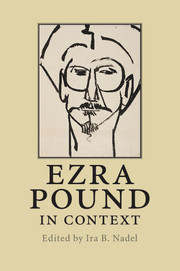Book contents
- Frontmatter
- Contents
- Notes on contributors
- Acknowledgements
- Chronology
- List of abbreviations and note on references to The Cantos
- Introduction
- Part I Biography and works
- Part II Historical and cultural context
- 16 The classics
- 17 Provençal and the troubadours
- 18 Dante and early Italian poetry
- 19 America
- 20 Venice
- 21 London
- 22 Paris
- 23 Rapallo and Rome
- 24 Pisa
- 25 Imagism
- 26 Vorticism
- 27 Music
- 28 Visual arts
- 29 Confucius
- 30 The Orient
- 31 Little magazines
- 32 Publishing and publishers
- 33 Modernism
- 34 Fascism
- 35 Anti-Semitism
- 36 Gender and sexuality
- 37 Race
- 38 Travel
- Part III Critical reception
- Further reading
- Index
27 - Music
Published online by Cambridge University Press: 05 July 2014
- Frontmatter
- Contents
- Notes on contributors
- Acknowledgements
- Chronology
- List of abbreviations and note on references to The Cantos
- Introduction
- Part I Biography and works
- Part II Historical and cultural context
- 16 The classics
- 17 Provençal and the troubadours
- 18 Dante and early Italian poetry
- 19 America
- 20 Venice
- 21 London
- 22 Paris
- 23 Rapallo and Rome
- 24 Pisa
- 25 Imagism
- 26 Vorticism
- 27 Music
- 28 Visual arts
- 29 Confucius
- 30 The Orient
- 31 Little magazines
- 32 Publishing and publishers
- 33 Modernism
- 34 Fascism
- 35 Anti-Semitism
- 36 Gender and sexuality
- 37 Race
- 38 Travel
- Part III Critical reception
- Further reading
- Index
Summary
A & C Black's 1929 Who's Who carried Ezra Pound's entry as “Poet and composer.” The music consisted of Le Testament (in three versions) – an opera on François Villon's poem of the same name, and ten violin pieces, including a setting of “Sestina Altaforte.” A first essay on the relationship of poetry to music (“I Gather the Limbs of Osiris”) eventually led to a weekly column as music critic for The New Age. Pound's sustained training of his ear gradually brought him to composing from this foundation in criticism. The sequence was, of course, backwards: composition came last.
Pound fought a hidden war against the “tyranny of words” and his own musical ignorance. Though he played elementary piano, his background hardly prepared him for the outré reaches of music theory and notation he undertook. Trained as a medievalist, Pound taught himself to read troubadour music, transpose cantus firmus, and transcribe the medieval neums into Western notation. In a modern idiom he studied overtones in harmonization, customized “melodic” minor scales to his needs, and developed composer's shorthand for polyrhythms and ostinati. We shouldn't be distracted by reports of a crude singing voice or tone-deafness. Neither presented an obstacle to composition or theory.
Music, in short, presented rough terrain. Ironically, Pound’s ur-text for composition was a seminal work of literary criticism: Dante’s De vulgarii eloquentia. Dante advocated armonia in the words and spelled out, with examples, the methods to achieve it. Returning to this work for a refresher on the arrangement of syllables, the application of dissonance, the delight in experiment, we gain entrée to Pound’s music.
- Type
- Chapter
- Information
- Ezra Pound in Context , pp. 298 - 312Publisher: Cambridge University PressPrint publication year: 2010



